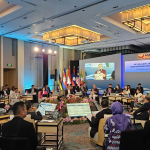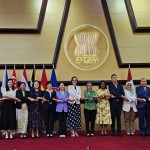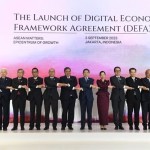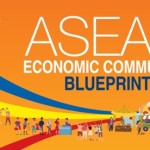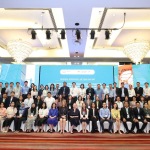Total number of posts 465.
Leaders of ASEAN countries, China, Japan and South Korea attended the 28th ASEAN+3 Summit in Malaysia, adopting a joint statement on strengthening economic and financial cooperation.
On the morning of October 27, leaders of ASEAN countries, China, Japan and South Korea attended the 28th ASEAN+3 Summit in Malaysia. The Conference adopted the Joint Declaration on Strengthening Regional Economic and Financial Cooperation.
The joint statement also emphasized the importance of building sustainable regional supply chains.
In his opening remarks, Malaysian Prime Minister and ASEAN Rotating Chair Anwar Ibrahim emphasized that ASEAN+3 "must redouble its efforts to cohesion and cooperation", and that it is necessary to establish a stockpile of medical supplies to respond to public health emergencies in the future.

On the South Korean side, South Korean President Lee Jae-myung said South Korea, China and Japan need to strengthen cooperation with ASEAN to better respond to emerging challenges such as trade protectionism and shifts in global supply chains. Lee said the region's challenges are becoming increasingly complex and multi-layered, with prominent issues such as an aging population, low birth rates, the digital divide, climate change, food and energy insecurity, and transnational crime.
Chinese Premier Li Qiang called on all parties to maintain their commitment to satisfactorily resolve differences through dialogue and consultation, jointly defend free trade and the multilateral trading system, and oppose all forms of protectionism, China is willing to strengthen the coordination of development strategies with all parties, persist in the line of openness and cooperation, and take more practical actions to jointly achieve new achievements for the development of the East Asian region.
Foreign Minister Motegi attended the meeting on behalf of Prime Minister Sanae Takaichi, emphasizing Japan's commitment to strengthening cooperation with ASEAN, China and the Republic of Korea in the areas of financial stability and food security.
Contents of the ASEAN Plus Three Leaders' Statement on Strengthening Regional Economic and Financial Cooperation:
WE, Heads of State/Government of the Member States of the Association of Southeast Asian Nations (ASEAN), the People’s Republic of China, Japan, and the Republic of Korea, gathering at the 28th ASEAN Plus Three (APT) Summit on 27 October 2025 in Kuala Lumpur, Malaysia;
RECOGNISING the pivotal role of the APT members’ collective efforts for regional economic and financial cooperation as well as the promotion of inclusive and sustainable development amid this uncertain environment;
REAFFIRMING commitment on cooperation to maintain the region’s stability and growth momentum, WELCOMING the significant outcomes of the 28th ASEAN+3 Finance Ministers and Central Bank Governors’ Meeting and endorsing the strategic direction outlined in their Joint Statement.
RECOGNISING the ongoing external headwinds lead to economic fragmentation, affecting trade, investment, and capital flows across the region. DETERMINED to further strengthen APT Cooperation for economic and financial resilience, equipping our markets to effectively respond to global uncertainties, emerging challenges including climate change, economic volatility and to further support strong, sustainable, balanced and inclusive regional growth; and
UNDERSCORING the importance of upholding multilateralism, and strengthening regional unity and cooperation in addressing shared challenges and heightened uncertainty, while upholding ASEAN centrality in the evolving regional architecture to foster inclusivity, sustainability, development and prosperity.
DO HEREBY DECLARE TO:
1. FOSTER collaboration that promotes economic prosperity, financial stability and sustainable development among APT economies. This cooperation should be based on mutual respect, trust and benefit, in accordance with the principles of the ASEAN Charter and the Treaty of Amity and Cooperation in Southeast Asia (TAC), as well as the ASEAN Outlook on the Indo-Pacific (AOIP);
2. COMMIT to deepening our regional economic and financial integration through the full implementation of the APT cooperation work plan (2023-2027) and APT Economic Cooperation Work Programme (ECWP) (2025-2026). This concerted effort will prioritise impactful cooperation to ensure our region can effectively navigate global headwinds and maintain its economic dynamism;
3. COMMIT to the full and effective implementation as well as robust utilisation of commitments under ASEAN’s agreements with APT members, which include but are not limited to the ASEAN-China Free Trade Area 3.0, the ASEAN-ROK Free Trade Area, the ASEAN-Japan Comprehensive Economic Partnership as well as the Regional Comprehensive Economic Partnership, while ensuring they remain modern, comprehensive, inclusive and contribute to enhancing regional trade and deeper integration;
4. BUILD sustainable, inclusive, connected, resilient and secure regional supply chains. ENHANCE the efficiency of free flow of goods, supply chain connectivity and services. PROMOTE sustainable and inclusive regional economic growth and integration through cooperation to strengthen supply chain connectivity, leveraging on new growth drivers such as digital transformation, green economy including promotion of transition finance, blue economy and creative economy;
5. REAFFIRM our support for a predictable, transparent, inclusive, free, fair, sustainable and rules-based multilateral trading system, with the World Trade Organization (WTO) at its core. WELCOME constructive engagement with WTO Members to advance necessary reform and ensure that the multilateral trading system remains predictable, transparent, non-discriminatory, open and capable of addressing new and emerging challenges. COMMIT to supporting ASEAN’s efforts to deepen regional economic integration, while strengthening and expanding the APT’s economic links, as well as seeking out economic cooperation with new partners;
6. COMMEND the APT Fiscal Policy Exchange Initiative introduced in 2025 and look forward to its potential to serve as a regular platform for dialogue on fiscal policy; SUPPORT the ongoing review and update of the “Strategic Directions of APT Finance Process”to ensure the Finance Process remains strategic, relevant and responsive. SUPPORT the progress in exploring the Policy Adjustment Instrument (PAI) through the introduction of the Structural Policy Improvement and Review Instrument with Technical Assistance (SPIRIT) as a voluntary and non-binding facility, which aims to provide tailored technical support for members’ structural reform efforts;
7. DEEPEN regional financial cooperation to support APT economies to address risks and challenges by strengthening the Chiang Mai Initiative Multilateralisation (CMIM) as an effective regional financial safety net, a vital component of the global financial safety net. COMMEND continued efforts aimed at transitioning the CMIM to include a paid-in capital (PIC) structure, which would further complement the global financial safety net. WELCOME the establishment of the Rapid Financing Facility (RFF) under the CMIM which will enhance regional resilience by offering members timely access to emergency financing during urgent balance of payments needs, and support the use of eligible freely usable currencies (FUCs) as its currencies of choice;
8. APPRECIATE AMRO for the progress in strengthening its organisational capacity to align with the implementation of its Strategic Direction 2030. SUPPORT AMRO’s central role in regional economic surveillance and as trusted advisor, encouraging its work in providing timely police advice to help members navigate an increasingly uncertain global environment and crucial technical support for the CMIM;
9. DEEPEN our local currency bond markets development through Asian Bond Markets Initiative (ABMI). COMMEND the progress achieved under the ABMI and SUPPORT it to contribute to and promote the local currency bond market development and sustainable finance ecosystem in the region. COMMEND the Credit Guarantee and Investment Facility (CGIF)’s solid business growth in recent years and encourage it to play a bigger role in further developing local currency bond market;
10. ACCLAIM the progress achieved in advancing Disaster Risk Financing Initiative (DRFI), with the support of the Southeast Asia Disaster Risk Insurance Facility (SEADRIF) and other multilateral partners including World Bank, Asian Development Bank, Asian Development Bank Institute and Global Asia Insurance Partnership in strengthening our region’s resilience against disasters including those coming from climate change;
11. RECOGNISE the vital role of the ASEAN+3 Finance Think-tank Network in harnessing our region’s intellectual resource to support macroeconomic and financial stability. WELCOME the recent expansion of ASEAN+3 Finance Think-tank Network, marking a significant step in enhancing its capacity as a platform for regional cooperation and policy dialogue; and
12. TASK relevant Sectoral Bodies, particularly those with relevant APT mechanisms, to follow up on the implementation of this Statement, as well exploring new areas that can benefit the regional economic and financial cooperation.
ADOPTED in Kuala Lumpur, Malaysia, on this Twenty-seventh Day of October in the Year Two Thousand and Twenty-Five in a single original copy in the English Language.
Source: Compiled by the Multilateral Trade Policy Department, Ministry of Industry and Trade of Viet Nam







